Neuroscience
Study identifies new biomarkers of Alzheimer's disease
Recent advances in the study of proteomes (i.e., the entire range of proteins expressed by human cells and tissues) have opened new opportunities for identifying the biological markers of specific diseases or mental disorders. ...
18 hours ago
0
33

Astrophysicists uncover supermassive black hole/dark matter connection in solving the 'final parsec problem'
Researchers have found a link between some of the largest and smallest objects in the cosmos: supermassive black holes and dark matter particles.
Researchers have found a link between some of the largest and smallest objects in the cosmos: supermassive black holes and dark matter particles.
Astronomy
11 hours ago
5
311

Researchers advance understanding of a key celiac enzyme
Celiac disease affects around one in a hundred people worldwide, and those that have the autoimmune disorder have no choice but to stick to a gluten-free diet forever—at the moment, ...
Celiac disease affects around one in a hundred people worldwide, and those that have the autoimmune disorder have no choice but to stick to a gluten-free ...
Biochemistry
11 hours ago
0
34

Organic polymer blend microspheres exhibit ultra-low threshold lasing with highest reported quality factor
Researchers at IMDEA Nanociencia have fabricated high quality microspheres from conjugated organic polymer blends with excellent lasing properties. The laser emission of the microspheres ...
Researchers at IMDEA Nanociencia have fabricated high quality microspheres from conjugated organic polymer blends with excellent lasing properties. The ...
Nanophysics
11 hours ago
0
31
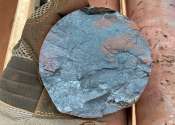
New date for Earth's largest iron deposits offers clues for future exploration
Research led by Curtin University reveals that Earth's largest iron ore deposits—in the Hamersley Province of Western Australia—are about one billion years younger than previously believed, a discovery which could greatly ...
Earth Sciences
13 hours ago
0
112
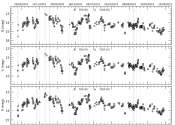
Study investigates optical variability of blazar S5 0716+714
Using the TÜBİTAK National Observatory, astronomers from Turkey and India have observed a bright blazar known as S5 0716+714. Results of the observational campaign, published July 12 on the pre-print server arXiv, yield ...
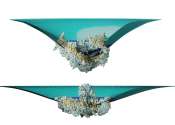
Discovery of Piezo1's new signaling mechanism may aid search for better pain and itch treatments
The human body's sense of touch is so important it can be found throughout the body, not just on the skin. Two tiny sensors of touch, Piezo1 and Piezo2, signal the lightest pressures and can be found monitoring the circulatory ...
Cell & Microbiology
11 hours ago
0
18

Ciliated eukaryotes study offers simple, versatile method for tubulin staining
Ciliates, a group of single-celled ciliated eukaryotes, have been studied since the dawn of light microscopy, with over 10,000 species described. Cilia are the key feature of ciliates and contribute to their diversity. They ...
Cell & Microbiology
12 hours ago
0
48
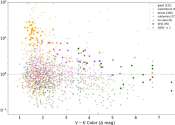
Effects of stellar magnetism could expand criteria for exoplanet habitability
Interest in Earth-like planets orbiting within the habitable zone of their host stars has surged, driven by the quest to discover life beyond our solar system. But the habitability of such planets, known as exoplanets, is ...
Astrobiology
13 hours ago
0
122

'New El Niño' discovered south of the equator
A small area of the southwestern Pacific Ocean, near New Zealand and Australia, can trigger temperature changes that affect the entire Southern Hemisphere, a new study has found.
Earth Sciences
14 hours ago
0
272
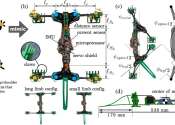
Bio-inspired lizard robot reveals what's needed for optimum locomotion
Can a robot mimicking a climbing and walking lizard give new insights into the evolution and advantages of different movements in humans and other animals?
Robotics
11 hours ago
0
28
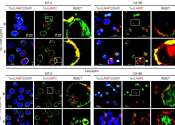
A new drug target identified for diseases associated with leukemia-causing virus
A team of researchers from Penn State College of Medicine found a new target for treating diseases associated with human T-cell leukemia virus type 1 (HTLV-1). They determined that blocking a class of enzymes called kinases, ...
Diseases, Conditions, Syndromes
12 hours ago
0
4

The Future is Interdisciplinary
Find out how ACS can accelerate your research to keep up with the discoveries that are pushing us into science’s next frontier
 Medical Xpress
Medical Xpress

A new drug target identified for diseases associated with leukemia-causing virus

Study reveals 'cell death cascade' in airway cells infected with SARS-CoV-2

Study confirms maternal positive mental health correlated to children's brain development

New tools reveal neuropeptides, not neurotransmitters, encode danger in the brain

Blood proteins predict the risk of developing more than 60 diseases, study finds

Knockout of CD5 on CAR T cells shown to boost anti-tumor efficacy

Skeletal muscle regeneration discovery paves the way for targeted therapies for muscle disorders

Peptide cocktails show promise in combating antibiotic resistance

Cure for male pattern baldness given boost by sugar discovery

Prostate cancer blood test equally effective across ethnic groups

Bipolar disorder and alcohol: It's not as simple as 'self-medication,' says study

An over- or under-synchronized brain may predict psychosis

Study finds increase in maternal deaths from non-respiratory during SARS-CoV-2 pandemic
 Tech Xplore
Tech Xplore

Scientists use AI to predict a wildfire's next move

Less is more: Efficient hydrogen production with less precious metals

Study showcases new method for better grouping in data analysis

Sodium-ion batteries are set to spark a renewable energy revolution

First megawatt charger for electric trucks unveiled

Why does the Olympics have an 'AI agenda' and what does it mean for the future of sport?

New software provides advanced grid simulation capabilities
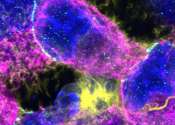
Study reveals 'cell death cascade' in airway cells infected with SARS-CoV-2
Researchers Jenny Ting, Ph.D., the William Kenan Distinguished Professor of Genetics and professor microbiology and immunology at the UNC School of Medicine, and Kaixin Liang, Ph.D., a postdoctoral researcher in the Ting ...
Diseases, Conditions, Syndromes
12 hours ago
0
69
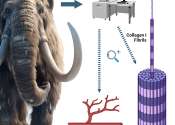
Nanoscopic imaging aids in understanding protein, tissue preservation in ancient bones
A pilot study from North Carolina State University shows that nanoscopic 3D imaging of ancient bone not only provides further insight into the changes soft tissues undergo during fossilization, it also has potential as a ...
Biotechnology
13 hours ago
0
56

Genetic diagnostics of ultra-rare diseases: Large multicenter study identifies 34 new genetic diseases
The majority of rare diseases have a genetic cause. The underlying genetic alteration can be found more and more easily, for example, by means of exome sequencing (ES), leading to a molecular genetic diagnosis. ES is an examination ...
Genetics
18 hours ago
0
46
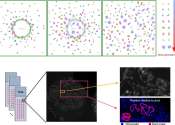
AI model identifies certain breast tumor stages likely to progress to invasive cancer
Ductal carcinoma in situ (DCIS) is a type of preinvasive tumor that sometimes progresses to a highly deadly form of breast cancer. It accounts for about 25% of all breast cancer diagnoses.
Oncology & Cancer
13 hours ago
0
32

Submarine canyons are crucial for the instability of the Antarctic ice sheet, suggests study
Antarctic canyons play a crucial role in the instability of the East Antarctic Ice Sheet, as they facilitate the transfer of relatively warm water (Circumpolar Deep Water) from the abyssal areas to the continental shelf and ...
Earth Sciences
18 hours ago
0
43
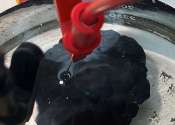
Metallic minerals on the deep-ocean floor split water to generate 'dark oxygen,' new study finds
An international team of researchers, including a Northwestern University chemist, has discovered that metallic minerals on the deep-ocean floor produce oxygen—13,000 feet below the surface.
Earth Sciences
17 hours ago
0
187

Bio-hybrid robotics need regulation and public debate, say researchers
Researchers are calling for regulation to guide the responsible and ethical development of bio-hybrid robotics—a pioneering science which fuses artificial components with living tissue and cells.
Robotics
13 hours ago
0
27

New technique streamlines synthesis of heavy element compounds
Molecular compounds with heavy elements, like americium, curium and others can now be synthesized in a streamlined and efficient way thanks to a new technique developed by Lawrence Livermore National Laboratory (LLNL) researchers.
Analytical Chemistry
14 hours ago
0
50

Octopus and squid pigments enhance sunscreen without harming the environment, researchers say
When Northeastern graduate Camille Martin and associate professor Leila Deravi co-founded Seaspire, a skincare ingredients company inspired by pigment in octopus and squid, their goal was to create a product that is good ...
Biotechnology
15 hours ago
0
148

Team develops a technique to detect nutrients in soil faster and more affordably
Every year, Missouri farmers lose millions of dollars in valuable nutrients that wash away into rivers and lakes. These nutrients—nitrates and phosphates found in fertilizers—are crucial for plant growth, but they wreak ...
Biotechnology
14 hours ago
0
20

Forging of joined-up approach at COP29 and COP16 vital for urgent action for climate and nature, say scientists
World leaders must take advantage of a pivotal window of opportunity for forging a much-needed joined-up approach to tackle climate change and biodiversity loss, say scientists from ZSL and York University. Without this, ...

New liquid single nucleotide polymorphism chip can enhance rubber tree breeding
A research team developed and validated a liquid single nucleotide polymorphism (SNP) chip named "HbGBTS80K," which includes 80,080 SNPs evenly distributed across 18 chromosomes. This SNP chip effectively distinguished 404 ...

Comprehensive evaluation identifies top finger lime varieties for commercial and ornamental use
A research team has conducted a comprehensive evaluation of nine finger lime varieties, identifying key differences in fruit peel color and suitability for commercial production. Xiangbinhong emerged as the best variety for ...

Sustainable management and regeneration of endangered Senegalia venosa needed in Ethiopia, says study
A research team has identified the distribution and regeneration status of the endangered Senegalia venosa in Tigray and Gonder drylands. They found it has a poor regeneration rate due to factors like charcoal production ...

On the origin of academic traditions—and some alternatives for debate
The field of science aims to be objective, repeatable and justified in its choices and methods. These principles are what distinguish accepted scientific findings from pseudo-science. Yet the experience of learning and working ...

Free software tool evaluates relative importance of predictors in generalized additive models
Generalized additive models (GAMs) are commonly used in ecological research for their ability to model complex nonlinear relationships. However, assessing predictor importance in the presence of concurvity is difficult due ...

Scientists resolves a long-debated anomaly in how nuclei spin
Atomic nuclei come in different shapes, varying from football-like ("prolate") to pancake-like ("oblate"). Prolate and oblate shapes have different moments of inertia. This is a body's resistance to having its speed of rotation ...

Using forest resources strengthens food security, study finds
Forests can reduce hunger in rural households while also capturing carbon and advancing sustainability goals for low- and middle-income countries, according to new research by University of Notre Dame experts.

Q&A: How machine learning is propelling structural biology
For Lucas Farnung, there is no question more fascinating than how a single fertilized egg develops into a fully-functioning human. As a structural biologist, he is studying this process on the smallest scale: the trillions ...

Western US faces wildfires as millions under heat warnings
Several western US states including California and Utah were battling wildfires on Monday as millions of Americans in the region were once again under heat alerts.

Researchers enhance tool to better predict where and when wildfires will occur
A newly enhanced database is expected to help wildfire managers and scientists better predict where and when wildfires may occur by incorporating hundreds of additional factors that impact the ignition and spread of fire.

A novel thermal insulation material for ultra-high temperature applications: Hierarchical porous high-entropy ceramics
Thermal insulation material is a critical part of the thermal protection system (TPS) of hypersonic vehicles. Recently, high-entropy ceramics have attracted great attention in thermal insulation for their low thermal conductivity ...

Insect pests study finds public surveillance is critical to early detection
A new study from the University of Maryland identifies key patterns and factors influencing insect pest establishment and detection across the U.S. and suggests public surveillance awareness and involvement is a critical ...

Decomposing 'refrigerants,' a potent greenhouse gas, using industrial waste
A research team has developed a technology to decompose refrigerants, a greenhouse gas 1,300 times more potent than carbon dioxide, using challenging-to-handle industrial waste.

Research team uncovers optimal conditions for soursop cultivation
A research team has identified the optimal edaphic and climatic conditions for the growth of soursop (Annona muricata L.), a plant with significant medicinal potential and nutritional value. Their findings provide crucial ...

Discovery of daphnane diterpenoids in Daphne pedunculata could lead to new HIV drugs
A research group led by Professor Wei Li of the Department of Pharmacognosy, Faculty of Pharmaceutical Sciences, Toho University, in collaboration with Shenyang Pharmaceutical University in China and Duke University Medical ...

Sensing ultraviolet light with the help of molecular switches
The old saying "the dose makes the poison" also holds true for ultraviolet (UV) light. While UV light is essential for vitamin D production, it is also important in phototherapy, several industrial processes, and plant growth. ...

Science, social studies classes can help young English-learning students learn to read and write in English
A new study finds that science and social studies classes may also help young students learn English, even when those classes include difficult and technical vocabulary. The paper is published in the Journal of Educational ...

Low-intensity grassland is better able to withstand the consequences of climate change
Climate change will have a considerable influence on the biodiversity and productivity of meadows and pastures. However, according to the results of the large-scale climate and land use experiment, the extent of these changes ...

Advanced explainable machine learning approach offers insights into complex pollutant interactions
Traditional environmental health research often focuses on the toxicity of single chemical exposures. However, in real-world situations, people are exposed to multiple pollutants simultaneously, which can interact in complex ...




























































